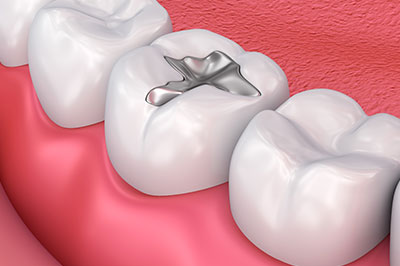


For many years, amalgam fillings, more commonly referred to as “silver fillings,” have represented the standard of care in rebuilding the form and function of a tooth that has been treated for dental decay. Composed of a combination of metals that include silver, tin, mercury and copper, dental amalgam has both the strength to withstand the heavy forces generated during chewing as well as the durability to retain its integrity over time. Although not as aesthetically pleasing as other types of restorations, amalgam fillings are less likely than some other types of fillings to break or wear down over time.
While dental amalgam contains elemental mercury, based on extensive studies and thorough reviews of scientific evidence, the American Dental Association (ADA), The Center for Disease Control and Prevention (CDC), the FDA, and the World Health Organization have all stated that amalgam is a safe and effective dental restoration that does not pose a risk to health. However, individuals with allergies or sensitivities to the metals in dental amalgam are advised to pursue other restorative options with their dentists.